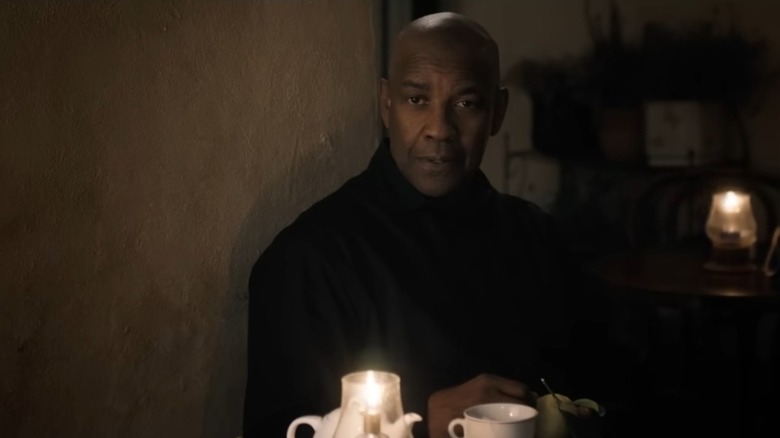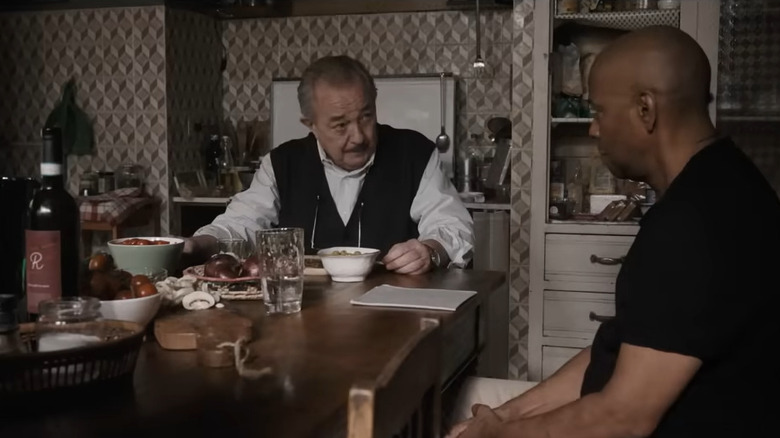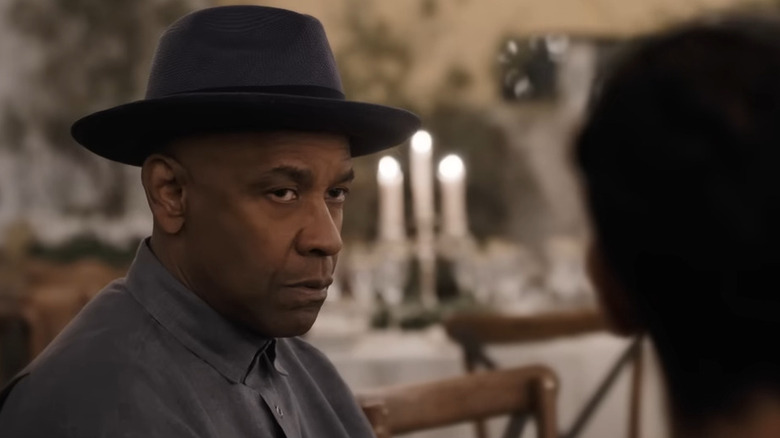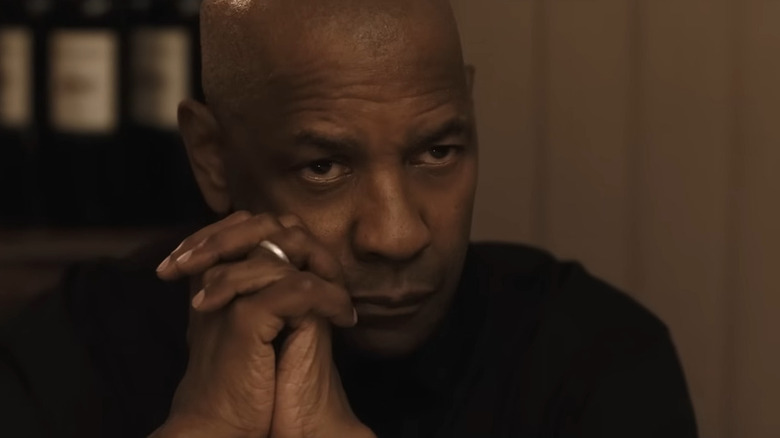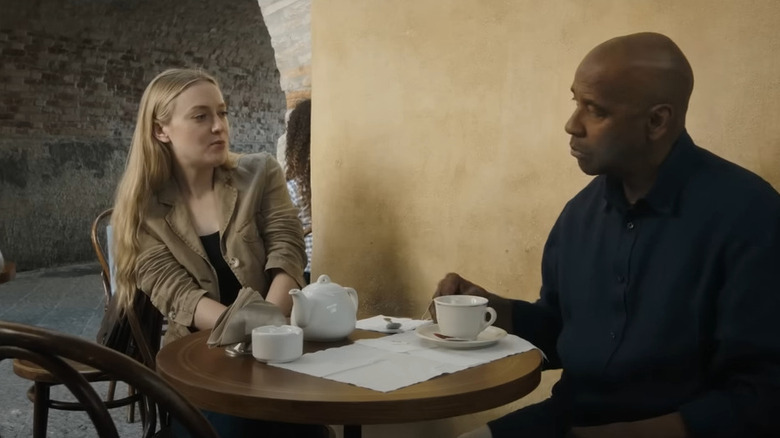The Equalizer 3 Ending Explained: The Killer Finds Peace
This piece was written during the 2023 WGA and SAG-AFTRA strikes. Without the labor of the writers and actors currently on strike, the movie being reviewed here wouldn't exist. This article also contains major spoilers for "The Equalizer 3."
The original 1985 TV series "The Equalizer," starring Edward Woodward, was part of a notable trend in television from the '70s and '80s. Multiple shows at the time were about dangerous, mysterious, lawless drifters who traveled from town to town seeking out justice and applying violence where it might be needed. The trend included shows like "Kung Fu," "Then Came Bronson," "The A-Team," "The Incredible Hulk," and a little later, "Renegade." Robert McCall was an ex-military man who had a talent for finding people in distress and helping them — violently — as the situation required.
In 2014, filmmaker Antoine Fuqua adapted "The Equalizer" to the big screen, casting Denzel Washington in the role of Robert McCall. In the movie, McCall was steelier, more stone-faced, and more serious. He was adept at violent action and motivated by an unflagging sense of righteousness. He was the bully's bully, willing to out-shoot any bad guy who was taking advantage of those weaker than him. The film was enough of a hit to warrant two sequels, with "The Equalizer 3" opening to all audiences on September 1, 2023.
Throughout the films, McCall has had no compunction about killing others, especially if he surmised them to be harmful criminals themselves. Luckily, McCall was never wrong. In "The Equalizer 2," he murders a villainous frat boy by slashing his throat with his own metallic platinum credit card. In "The Equalizer 3," he kills an Italian gangster by stabbing a gun barrel into his eye socket.
At the beginning of Part 3, McCall gets shot in the back. He'll spend the bulk of the film recovering, and it's during his recovery that the real themes of "The Equalizer 3" will come to light, and the arc of McCall will become clear: all the killer ever wanted was peace.
Catching up with The Equalizer 2 first
It was in "The Equalizer 2" that McCall's true calling came to light. He was a vigilante, yes, but more than anything, he fought for justice in his community. He was handy with guns and eager to murder mob bosses, but he also cleaned graffiti off his tenement and encouraged a local at-risk youth to read Ta-Nehisi Coates. McCall was a drifting murderer, but also a freelance civic planner. He didn't kill because he had an itchy trigger finger and an impulse toward death. He killed those who prevented the world from being a peaceful place. Because McCall is played by Denzel Washington — perhaps the best actor of his generation — audiences can appreciate him as a force for righteousness, and not just some ultra-cool murderous blowhard like most action heroes. McCall doesn't care about being cool. He cares about, well, equitable justice.
What he seeks, then, is a community that violence cannot infiltrate. He seeks peace. In "The Equalizer 3," McCall finds himself in Sicily, taking out some sort of local drug lord. It is when he is exiting a building full of corpses that McCall will be shot. He is taken to the local doctor (Remo Girone) and allowed to crash at his house, no questions asked.
Using a cane, and moving slowly, McCall begins to explore the small, peaceful hamlet and finds life to be simple, quiet, and kind. The food is amazing, and the tea is superb. He even may have a potential love interest in the form of the waitress Aminah (Gaia Scodellaro). This, we can see on McCall's face, might be where he needs to be.
When the local mafia begins stirring up trouble, there's more at stake than merely shooting bad guys. There's a retirement to protect.
Protecting retirement
Washington is 68 years old and McCall isn't the type of superhero to keep fighting until he is inevitably killed. He clearly wants a peaceful community he can rest in as he grows old. This small Sicilian village is his home. The locals embrace "Roberto," their new transplant, but the mafia has other plans. They want to buy out local businesses — by violent force — so they can transform broad parts of the island into casinos and resorts. When the evil Vincent (Andrea Scarduzio) begins roughing up the local policeman and burning down the fishmonger's shop, McCall has no choice but to strike back. When his wound heals, McCall proceeds to waste all the mob guys who wander into his field of vision.
McCall speaks out loud about what he wants to do: retire peacefully. He even notes that Sicily is the only place he's ever felt that he could be peaceful. Killing the mob guys is his final act of violent righteousness before he can settle into a life of seaside bliss.
This motivation — to retire — makes McCall far more interesting than most superheroes. Because superhero stories tend to extend indefinitely, no hero is permitted to have a third act. They must fight and fight and fight, far beyond the point when vigilante justice feels like a healthy lifestyle. Most superheroes have no ultimate goal in mind, other than to punch criminals or kill invading aliens. So long as there is a steady stream of villains, the fighting will continue. The world is never improved, and a superhero soon only knows how to be violent.
McCall certainly knows how to be violent, but he's human too. And humans want to achieve their goal of retiring peacefully. "The Equalizer 3" permits that much.
Or maybe ... this is the end of all crime everywhere?
Another angle might be even larger and more profound, however. McCall is more or less a superhero, and superheroes — as mentioned — are rarely permitted to retire. Being a superhero means a lifelong commitment to being a member of a freelance military that deals with all problems by punching, kicking, shooting, or firing laser blasts. If a superhero does have an endgame, it's to rid the world of all evil, right? To capture so many criminals and murder so many marauding aliens that the tide will eventually ebb. Someday, in a hero's ideal world, crime will be at an end, and utopia will have been reached.
Perhaps, in taking out two Italian crime syndicates over the course of one movie, McCall has finally equalized the world. Justice has been served. Perhaps "The Equalizer 3" is not merely an intimate story about McCall retiring and living in peace. Maybe his actions have finally actually provided world peace. It would be interesting to know if the rest of the world was now free of crime and violence after McCall had spent so many years murdering bad guys. Vengeance is a thing of the past, drugs were all seized, and McCall can retire not merely to a peaceful village, but to a peaceful planet.
If this is the Final Chapter as the advertising for "The Equalizer 3" so readily touts, couldn't it be a Final Chapter for everything? Perhaps it was Robert McCall, in stabbing gangsters through the eye, who instigated the ideal Republic. Maybe this is the way Utopia begins. It's a fun thought to entertain.
Will there be an Equalizer 4?
The advertising for "The Equalizer 3" has declared pretty openly that this was the final chapter in McCall's story. Director Antoine Fuqua, however, has already said just as openly that he would happily return for a fourth "Equalizer" film under the sole condition that he would be allowed to work with Washington again. For now, the director feels that "The Equalizer 3" really is the end of the road, but that could change. Fuqua and Washington have made five films together, and clearly have a very warm and open working relationship. It seems that if they could agree on a good angle for the character, then McCall could be brought out of retirement. That might, of course, do a disservice to everything that happened in "Equalizer 3," but it seems that Fuqua and Washington enjoy working together so much, then dismissing the retirement at the end of the movie could handily be ignored.
An "Equalizer 4," however, would allow for expansion of the McCall lore as well. In part 3, Dakota Fanning — Washington's co-star from "Man on Fire" — plays a CIA agent who represents law and order, and who serves as an intermediary between McCall's lawless crimefighting tactics and the suits higher-up in the Agency. Fanning has little to do in "Equalizer 3," and a fourth film would give the filmmakers an opportunity to correct that. Perhaps McCall and Emma Collins, Fanning's character, could become their own team.
Neither Washington nor Fanning have made any comments about an "Equalizer 4," however.
